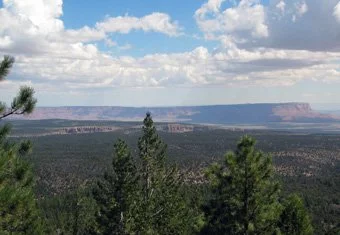Brett Dickson
Restoring native ecosystems on the Kaibab Plateau, Arizona: integrated models of fire, vegetation, plant invasion, and wildlife to guide sciencebased management and conservation.
Abstract
Northern Arizona’s Kaibab Plateau is one of the largest public wildlands in the Southwest. Beginning in the late 1800s, this landscape was dramatically altered by domestic livestock grazing, large-scale timber harvest, and aggressive fire suppression efforts. Recently, large stand-replacing fire events on the Kaibab Plateau have heightened concerns about fire dynamics and forest management, and stakeholders in the region have highlighted the immediate need to develop broad-scale restoration and conservation strategies. In 2005, the Grand Canyon Trust and The Conservation Fund purchased the vast Kane and Two Mile Ranches grazing allotments–comprising nearly 1-million acres north of the Grand Canyon, including a large proportion of the Kaibab Plateau landscape–with the goal of developing sustainable relationships between human communities and the natural environment. In this context, I will collaborate with researchers from the Grand Canyon Trust and Northern Arizona University to develop integrative methods and models of fundamental ecological processes to inform restoration, fire management, and invasive species management scenarios for the region. Specifically, I will 1) derive empirically-based models of vegetation composition, forest structure, and fire threat; 2) improve predictive capabilities relating to the occurrence of key invasive plant species, such as cheatgrass; and 3) develop predictive models relating movement and habitat connectivity for large carnivores and their prey as a function of these different management scenarios. My results will support a science-driven approach to collaborative land and resource management at the landscape level, and facilitate a new management paradigm for ecological restoration and conservation planning on the Kaibab Plateau and beyond.
Mentors
Dr. Thomas D. Sisk, Northern Arizona University; Ethan Aumack, Grand Canyon Trust
Undergraduate Education
B.S. San Jose State University, 1996: Biology (Conservation Biology emphasis)
Graduate Education
M.S. Northern Arizona University, 2001: in Forestry (Wildlife Ecology emphasis)
Ph.D. Colorado State University, 2006: Fish, Wildlife, and Conservation Biology
Current Title and Affiliation
President and Chief Scientist with Conservation Science Partners
Assistant Research Professor at Northern Arizona University



